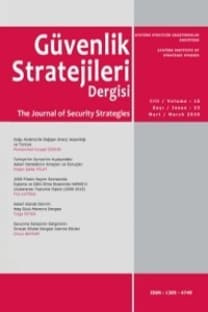Kuzey Kore’nin Rejim Güvenliğinde Nükleer Silahların Rolü Üstüne
Kuzey Kore, Rejim Güvenliği, Nükleer Silahlar, Juche, Songun
On the Role of Nuclear Weapons in North Korea’s Regime Security
North Korea, Regime Security, Nuclear Weapons, Juche, Songun,
___
- ARMSTRONG, Charles K. The North Korean Revolution, 1945–1950, Ithaca, N.Y.: Cornell University Press, 2003.
- AYOOB, Mohammed The Third World Security Predicament: State Making, Regional Conflict and the International System, Boulder, CO: Lynne Reiner, 1995.
- AYOOB, Mohammed Security in the Third World: The Worm About to Turn?, International Affairs, Vol. 60, No. 1 (Winter 1983– 1984).
- COLLİNS, Alan Contemporary Security Studies, Oxford University Press, 2016.
- GEERTZ, Clifford The Interpretation of Cultures, New York: Basic Books, 1974.
- HAGGARD, Stephan and Marcus Noland, Famine in North Korea: Markets, Aid, and Reform, New York: Columbia University Press, 2007.
- HUNTER, Helen-Louise Kim Il-song’s North Korea, Westport, Conn: Praeger, 1999.
- JOB, Brian L. The Insecurity Dilemma: National, Regime, and State Securities in the Third World, Lynne Rienner Publication, 1992.
- KİM, Sung Chull Michael D. Cohen, North Korea and Nuclear Weapons, Georgetown University Press, 2017.
- LANKOV, Andrei North of the DMZ: Essays On Daily Life On North Korea, Jefferson and London: Mcfarland, 2007.
- MİCHİSHİTA, Narushige, North Korea’s Millitary Diplomatic Campaigns 1966-2008, Routledge Taylor and Francis Group, 2010.
- MİGDAL, Joel S. Strong Societies and Weak States; State-Society Relations And State Capabilities In The Third World, Princton University Press, 1988.
- PİRİNÇÇİ, Ferhat Silahlanma ve Savaş: Ortadoğu’daki Silahlanma Girişimlerinin Küresel ve Bölgesel Güvenliğe Etkisi, Dora Yayın Dağıtım, 1. Baskı, 2010.
- RİCHARSON, Sharon Perspectives on U.S. Policy Toward North Korea: Stalemate Or Checkmate?, Lexington Books, 2006.
- WEBER, Marx The Theory of Social and Economic Organization, NY: Oxford University Press, 1947.
- CUMİNGS, Bruce “The Corporate State in North Korea,” in Hagen Koo, ed., State and Society in Contemporary Korea, Cornell University Press, 1993.
- JACKSON, Richard “Regime Security”, in Alan Collins (ed.), Contemporary Security Studies, Oxford: Oxford University Press, 2007.
- KİM, Samuel S. “Introduction: A Systems Approach,” in Kim, ed., The North Korean System in the Post–Cold War Era, New York: Palgrave, 2001.
- SAGAN, Scott D. “Why Do States Build Nuclear Weapons?: Three Models in Search of a Bomb”, International Security, Vol. 21, No. 3. (Winter, 1996-1997).
- OH, Kongdan and Ralph C. Hassig, “DPRK’s Socialist Constitution (Full Text),” Unofficial translation published by The People’s Korea, no. 1825 (September 19, 1998), in North Korea Through The Looking Glass, 2000.
- ALBERT, Eleanor “North Korea’s Millitary Capabilities”, Council On Foreign Relations, 2019.
- BAKER, Gideon “The Taming of the Idea of Civil Society,” Democratization, Vol. 6, No. 3 (Autumn 1999).
- BERMUDEZ Jr., Joseph S. “North Korea’s Development Of a Nuclear Weapons Strategy”, Us-Korea Institute at Sais.
- BERMUDEZ, Joseph S. “A history of ballistic misile development in North Korea”, Occasional Paper, No.2, Center for Nonproliferation Studies, California, February, 2000.
- BERMUDEZ JR., Joseph S. “A History Of Ballistic Missile Development in The DPRK”, Center For Nonproliferation Studies, 1999.
- BYMAN, Daniel Jennifer Lind; “Pyongyang’s Survival Strategy”, International Security, Vol. 35, No. 1 (Summer 2010).
- GERTZ, Bill “Iran-Syria Deal Revealed as Scuds Near Gulf Ports,” Washington Times, March 10, 1992.
- KOBLENTZ, Gregory D. “Regime Security: A New Theory For Understanding The Proliferation Of Chemical and Biological Weapons”, Contemporary Security Policy, Francis and Taylor, 2013.
- KİM, Ilpyong J. Historical Dictionary of North Korea, The Scarecrow Press Inc. Lanham, Marylanda and Oxford; 2003.
- MESQUİTA, Bruce Bueno de and George W. Downs, “Democracy and Development,” Foreign Affairs, Vol. 84, No. 5 (September/October 2005).
- SMİTH, Shane “North Korea’s Evolving Nuclear Strategy”, North Korea’s Nuclear Future Series, US-Korea İnstitute at SAİS, August 2015.
- SNYDER, Scott A. “The Motivations Behind North Korea’s Pursuit of Simultenous Economic and Nuclear Development”, Council On Foreign Relations, 20 November 2013.
- BEASLEY, Matthew “Regime Security Theory: Why Do States With No Clear Strategic Security Concerns Obtain Nuclear Weapons?”, University Of Oregon, 2009.
- CUMİNGS, Bruce “Why Didn’t North Korea Collapse, and Why Did So Many Influential Americans Think It Would?” paper presented at the conference “Why Communism Didn’t Collapse”, 19–20; and Lankov, North of the DMZ, 45–49.
- GEDDES, Barbara “What Do We Know about Democratization after Twenty Years? “ Annual Review of Political Science, (1999).
- HUXSOLL, David Baker “Regimes, İnstitutions and Foreign Policy Change”, Louisiana State University, 2003.
- KANTO, Dick K. “North Korea: Chronology Of Provocations, 1950-2003” , Report For Congress, 2003.
- WARDEN, John K. “North Korea’s Nuclear Posture: An Evolving Challange For US Deterrence”, Proliferation Papers, İFRİ, March 2017.
- “Information Circular (INFCIRC/140): Treaty On The Non-Proliferation Of Nuclear Weapons”, International Atomic Energy Agency (IAEA), 22 Nisan 1970, https://www.iaea.org/ sites/default/files/publications/documents/infcircs/1970/infcirc140.pdf (Erişim Tarihi: 10.01.2021).
- https://www.un.org/disarmament/wmd/nuclear/npt/text (Erişim Tarihi: 10.01.2021).
- “Statement of DPRK Government on its withdrawal from NPT” http://www.kcna.co.jp/ item/2003/200301/news01/11.htm (Erişim Tarihi: 10.01.2021).
- HAN S.Park, “Military First Politics (Songun): Understanding Kim Jong-il’s North Korea”, Academic paper series, Korea Economic Institute, 2007, ss. 1-5 https://keia.org/ publication/military-first-politics-songun-understanding-kim-jong-ils-north-korea/ (Erişim Tarihi: 16.06.2021).
- https://www.globalsecurity.org/military/world/dprk/songun-chongchi.htm (Erişim Tarihi: 21.01.2021).
- SIPRI, http://armstrade.sipri.org/armstrade/page/trade_register.php (Erişim Tarihi: 24.03.2021).
- VORONTSOV Alexander, “North Korea’s Military First Policy: A Curse or a Blessing?”, 2006 https://www.brookings.edu/opinions/north-koreas-military-first-policy-a-curse-or-a-blessing/ (Erişim Tarihi: 16.06.2021).
- WERTZ Daniel, “Denuclearization of Korean Peninsula Is DPRK’s Invariable Stand,” Korean Central News Agency, September 29, 2013 https://www.ncnk.org/resources/briefing-papers/all-briefing-papers/history-u.s.-dprk-relations (ErişimTarihi:17.01.2021).
- ISSN: 1305-4740
- Yayın Aralığı: 3
- Başlangıç: 2005
- Yayıncı: Millî Savunma Üniversitesi Atatürk Stratejik Araştırmalar ve Lisansüstü Eğitim Enstitüsü
Avustralya’nın Asya-Pasifik’te Tehdit Algısı: Sarı Tehlike (1850-1914)
Dinî Motivasyonlu Radikalleşmenin Özellikleri: Nedenler ve Süreç
Kuzey Kore’nin Rejim Güvenliğinde Nükleer Silahların Rolü Üstüne
Yasemin ÇOKGÜÇLÜ, Ferhat PİRİNÇÇİ
Ege Denizi’nde Yetki Alanları Paylaşımının Öncülü: Karasuları Sorunu
Kuşak Yol Girişimi Kapsamında Deniz ve Demir İpekyolu’nun Rekabeti
